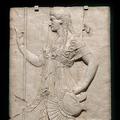027 Pronomina - hic, ille, iste
|ce (proche)|ce (là-bas)|ce (là)
Pronouns (1)|||that
027 Pronomen – hier, das, das
027 Pronouns - here, that, this
027 Pronombres - aquí, aquello, esto
027 代名詞 - ここ、あれ、これ
027 Voornaamwoorden - hier, dat, dit
027 Zaimki - tutaj, tamto, to
027 Pronomes - aqui, aquilo, isto
027 Местоимения - здесь, тот, этот
027 Займенники - ось, той, цей
027 Pronoms - ici, là, celui-ci
Varia sunt studia hominum; hic divitias amat, ille gloriam; hunc bellum delectat, illum agricultura; huic magistratus et honores cordi sunt, illi litterarum studia; hic poetis scriptoribusque favet, ille gladiatoribus.
Divers|sont|études|des hommes|ici|richesses|aime|lui|gloire|celui-ci|guerre|plaît|celui-là|agriculture|à celui-ci|magistrature|et|honneurs|chers|sont|à celui-là|des lettres|études|ici|aux poètes||favorise|lui|aux gladiateurs
various||interests|||wealth|loves||glory|this|war|delights in war|him|farming|to this one|the magistracy||honors|dear to him||to him|of literature||here|the poets|and writers|favors poets and writers|he|to the gladiators
||||||||名声||||||||||心に||||||||支持する||剣闘士
||||||||||||||||||||||||||||a los gladiadores
Υπάρχουν μελέτες σε ανθρώπους? ο πλούτος αυτού του ανθρώπου που αγαπά, είναι η δόξα του? ο πόλεμος είναι γλυκός με τον ίδιο, η εκτροφή? είναι αγαπητή στους κυβερνήτες και τους τιμά αυτό, με τον ίδιο, η επιδίωξη της μάθησης? Εδώ οι ποιητές scriptoribusque φίλος απ 'όλα, ο ίδιος μονομάχους, και το.
There are human studies; the riches of this man he loves, he is the glory of; the war is sweet to him, it's husbandry; are dear to the rulers, and the honors of this, to him, the pursuit of learning; here the poets scriptoribusque friend of all, he gladiators, and the.
人間の関心は様々である; ここでは富を愛し、あちらでは名声を求めている; この人は戦争を楽しみ、あの人は農業を好む; この人は役人や名誉に心を寄せ、あの人は学問に励む; ここでは詩人や作家を応援し、あちらでは剣闘士を支持している。
Исследования людей различны; один любит богатство, другой славу; Он наслаждается этой войной, этим сельским хозяйством; к этому магистраты и почести сердца, к изучению литературы; один предпочитает поэтов и писателей, другой гладиаторов.
Les intérêts des hommes sont variés ; ici, il aime la richesse, là, il aime la gloire ; celui-ci est ravi par la guerre, celui-là par l'agriculture ; à celui-ci, les magistratures et les honneurs tiennent à cœur, à celui-là, l'étude des lettres ; ici, il favorise les poètes et les écrivains, là, il favorise les gladiateurs.
Stulti modo hoc, modo illud laudant amantque.
Les fous|tantôt|ceci|tantôt|cela|louent|et aiment
fools|only||only|that|praise|and they love
|ただ|||||愛している
||||||y aman
Stupid thing now that praise and love.
愚かな者たちは、これを褒め、あれを愛する。
Дураки хвалят и любят именно это, именно это.
Les fous louent et aiment tantôt ceci, tantôt cela.
Melior est certa pax quam incerta victoria: haec in deorum manu est, illa in tua.
Meilleure|est|certaine|paix|que|incerta|victoire|celle-ci|dans|des dieux|main|est|celle-là|dans|ta
better|is|certain|peace|than|uncertain|victory||||||||
|||||不確かな|||||||||
||||||victoria incierta||||||||
Peace is better than Victory is certain: this is in the hands, it is in yours.
不確実な勝利よりも確実な平和の方が良い: 平和は神々の手の中にあり、勝利はあなたの中にある。
Верный мир лучше неуверенной победы: одно в руках богов, другое — в ваших.
Une paix certaine est meilleure qu'une victoire incertaine : celle-ci est dans la main des dieux, celle-là est dans la tienne.
Maxima laus Achillis et Ulixis est; huius prudentia, illius fortitudo carminibus Homeri celebratur.
La plus grande|louange|d'Achille|et|d'Ulysse|est|de lui|prudence|de lui|force|par les poèmes|d'Homère|est célébrée
the greatest|praise|Achilles||Ulysses||of this|wisdom|his|strength|in the songs||is celebrated
|賛美|||||この人の||||||
||||Ulises||||||cantos de Homero|de Homero|
The greatest praise Achilles and Ulysses; This wisdom, his strength is celebrated by the poet Homer.
アキレウスとウリシーズの最大の賛美はこれです。この知恵は、彼の強さはホメロスの詩によって称賛されています。
Наибольшая похвала принадлежит Ахиллу и Одиссею; Благоразумие одного и смелость другого воспеваются в стихах Гомера.
La plus grande louange d'Achille et d'Ulysse est ; la prudence de celui-ci, la force de celui-là est célébrée dans les poèmes d'Homère.
Hoc praeceptum observa, puer: Ora et labora!
Ce|précepte|observe|garçon|Prie|et|travaille
this|command|observe||pray||work
||守れ||||働け
||||||trabaja
This precept, consider the child Pray and work!
この教えを守りなさい、少年:祈り、そして働け!
Соблюдай эту заповедь, дитя: Молись и работай!
Observe cette règle, garçon : Prie et travaille !
Omnibus notum est illud: Per aspera ad astra!
à tous|connu|est|cela|par|les épreuves|vers|les étoiles
|known||that||rough||the stars
|||||||星々へ
All known is this: Through hardships to the stars!
それは誰もが知っていることです:困難を乗り越えて星へ!
Это знают все: через трудности к звездам!
Tout le monde connaît cela : Par des chemins difficiles, vers les étoiles !
Graeci et Romani nobilissimi populi antiquitatis sunt; illi in artibus et litteris, hi in bellica laude egregii fuerunt.
Grecs|et|Romains|très nobles|peuples|de l'antiquité|sont|eux|dans|les arts|et|les lettres|ceux-ci|dans|militaire|gloire|éminents|furent
the Greeks|||most noble||of antiquity||they||the arts||literature|these||military|glory|outstanding|
||||||||||||||戦争の||優れた|
They are the people of antiquity, the Greeks and the Romans were the renowned of the; to him, in the arts and letters, and these are in the military distinction, of being an excellent had gone before.
ギリシャ人とローマ人は古代の最も高貴な民族である。彼らは芸術や文学において優れており、こちらは戦の名誉において素晴らしいものであった。
Греки и римляне — благороднейшие народы древности; первые в искусстве и литературе, вторые в войне заслуживали высшей похвалы.
Les Grecs et les Romains sont les peuples les plus nobles de l'antiquité ; les premiers étaient excellents dans les arts et les lettres, les seconds dans la gloire militaire.
Hae res nobis placent, illae vobis.
Ces|choses|à nous|plaisent|Celles|à vous
these|things||please|those|
主語|||||
These things we like, it talks to you.
これらの事柄は私たちに好ましく、あれらはあなたたちに好ましい。
Нам нравятся эти вещи, они нравятся вам.
Ces choses nous plaisent, celles-là vous plaisent.
Haec studia iuvenes amant, illa senes.
Ces|études|jeunes|aiment|celles|vieillards
these||young men||these|old men
|||||the old
Estas|estudios|jóvenes||esas|
These studies young people who love the elderly.
これらの学問は若者に愛され、あれは高齢者に愛されている。
Молодежь любит эти занятия, пожилые любят их.
Ces études plaisent aux jeunes, celles-là aux vieux.
Pristina tempora laudare, haec vituperare solemus.
ancienne|temps|louer|ces|blâmer|avons l'habitude
Pristina times||to praise||we criticize|we are accustomed
プリシュティナ|||||私たちは
Former Times praised this complain accustomed.
過去の時を称賛し、これを非難するのが私たちの常です。
Мы привыкли восхвалять прежние времена и упрекать вторые.
Nous avons l'habitude de louer les temps passés et de critiquer ceux-ci.
Facta ista, amice, mihi displicent.
faits|ces|ami|à moi|déplaisent
the facts|these|||displease me
||||不満だ
||||No me gustan.
After completing this, my friend, I do not like.
その行為は、友よ、私には好ましくありません。
Эти факты, друг мой, меня не радуют.
Ces actions, mon ami, me déplaisent.
Amicitiam ad tuum fructum revocas: istius generis societas neque firma neque honesta est.
amitié|à|ton|profit|tu ramènes|de ce|genre|société|ni|solide|ni|honnête|est
friendship|||benefit|you call back|of this|of this kind|society||firm||honorable|
|||利益||そのような|の種類||||||
That the friendship of the fruit of you bring me back to your: society can be neither the firm nor the arguments of that sort it is honorable.
友情をあなたの利益のために呼び戻す:そのような種類の関係は強くもなく、誠実でもありません。
Вы возвращаете дружбу своим плодам: такое общество не является ни твердым, ни честным.
Tu évoques l'amitié à ton avantage : une telle association n'est ni solide ni honnête.
SENT_CWT:AFkKFwvL=5.05 PAR_TRANS:gpt-4o-mini=2.22
fr:AFkKFwvL
openai.2025-01-22
ai_request(all=16 err=0.00%) translation(all=13 err=0.00%) cwt(all=137 err=1.46%)

